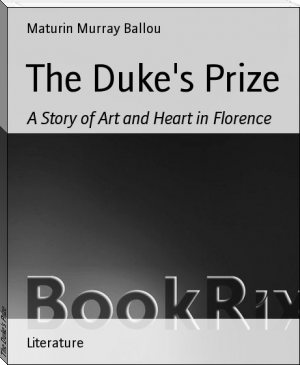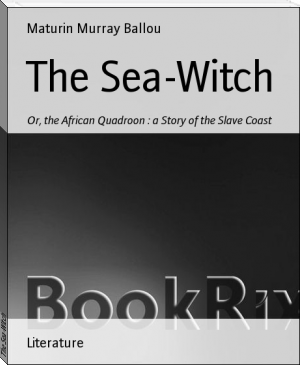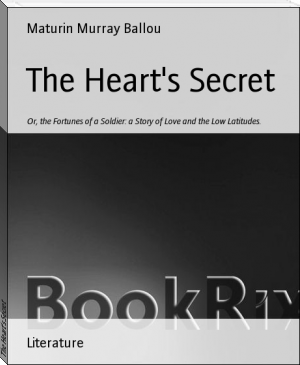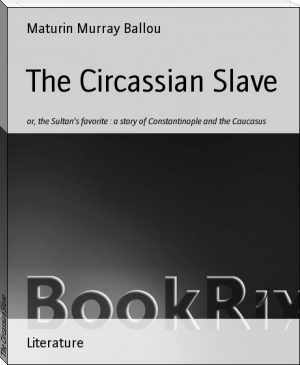The Duke's Prize by Maturin Murray Ballou (popular books of all time TXT) 📕

- Author: Maturin Murray Ballou
Book online «The Duke's Prize by Maturin Murray Ballou (popular books of all time TXT) 📕». Author Maturin Murray Ballou
"There is much between thee and me, Florinda," said her companion, sighing heavily; "and of a metal worse than all others-pride and gold! jailors both of the daring heart!"
"Nay, dear Carlton, thou art ever foreboding ills," said the lady persuasively, and in a voice as sweet as that of the idolized Pagoda Thrush of India.
"Perhaps so; and yet full well I know that I am no favorite of fortune, by stern experience."
"She will smile on thee yet, believe me, Carlton; and the more sweetly for this seeming neglect. She's a fickle goddess, and often plays the coquette, but, like others of this class, she seldom chides but she smiles again the more winningly."
"She has already done so through thee, Florinda."
Florinda answered with her eyes.
"Ah, I am blessed indeed in thee; and poorly do I appreciate the blessing of thy love, when I forget myself and complain."
"Now thou art content."
"In thy smiles, dearest, ever."
And Carlton pressed the hand with fervor to his lip that was smilingly extended towards him.
"Ah, how long it may be, before I can call this little hand mine."
"It is thine already, Carlton."
"Thy heart is, I trust; but the hand, Florinda, is quite another thing."
"True, Carlton."
"My means are so humble."
"You would make them so."
"But are they not, Florinda?"
"Not in my eyes."
"The future looks dark to me."
"The great proficiency you have attained in your profession, as an artist, dear Carlton, argues well for our hopes. Already has thy name reached the Grand Duke as one of remarkable ability in thy noble art; and such constant attention and unwearied industry must ensure improvement."
"True, dearest, I may in time hope to be counted, a worthy follower of those whose noble efforts grace the grand gallery, and the halls of the Palazzo Pitti; but alas, many years of toil might not place me in the pecuniary eye of the duke, as a fitting suitor for thy peerless portion. And then, Florinda, the pride of birth! Alas! I have little hopes of ever attaining my most earnest wish-that which would render me the envy of all Florence-thy hand, Florinda."
"Have I not possessions enough for both of us, dear Carlton? Indeed, I am told that my rightful property bears a goodly proportion to that of the Grand Duke himself, who has the reputation here in Florence of possessing unbounded wealth-actually unequalled in amount by that of any European monarch. Until the prospect of aiding you by this amplitude of fortune occurred to my mind, I saw no value in this boasted wealth; but now that I know that you will be benefited by it, Carlton, I rejoice at its possession and its magnitude."
"Dearest," said the artist, as he listened to her generous declaration.
"There will be no want, no question of necessity; all shall be yours."
"In your love and kindness of heart, you do not consider these things as does the world, Florinda. The greater the amount of thy riches, the farther art thou removed from me; thus reasoneth the world-the cold and calculating world."
"Nay, Carlton, thou art again foreboding," said the lady in the sweet, honeyed tongue of her land. "All will yet be as our hearts could wish, I am confident."
"Love sees with blind eyes, dearest."
"I know the proverb; but each case is a peculiar one, and this-is not this more so than any other?"
"So thy gentle heart would make it," he answered tenderly.
"And will not yours assent?"
"In one respect-yes."
"And that is--"
"Never was one so loved as thou art; and yet who could look upon those eyes, and hear thee speak thus, and know the goodness and gentleness of thy kind heart, and not love thee, Florinda?"
"Ah, flatterer!"
"Dost thou mean that?" said Carlton, earnestly and quickly.
"Nay, forgive me, Carlton," said his fair companion.
"Always but when thou shalt question my sincerity; and yet," he continued, after a moment's pause, "there are ample grounds for such suspicions."
"Say not so, Carlton."
"Behold thy large fortune; am I not penniless?-thy noble birth; am I not an humble citizen? O, Florinda, there are few in this cold and mercenary world that would accord to me, under these circumstances, the meed of sincerity."
"There is one who will never doubt thee," said the lovely girl, placing a hand affectionately within his.
"Dear Florinda, I have thought of another tie to bind us to each other still more dearly, if possible."
"Pray, what is that, Carlton?"
"We are both orphans, Florinda; both stand, as it were, alone in the world, without any natural protectors even from childhood."
"True," said Florinda, "my parents died while I was yet too young to know or love them and thine, Carlton?"
"While I was an infant."
"How pleasant it must be to have parents to love and advise one. I have often envied my companions."
"Ay, it must indeed be a source of happiness; and none would seem to deserve them more than so gentle a spirit as thine."
"It is indeed an enviable blessing."
"Father and mother are sweet words," said the artist, thoughtfully,--and drawing her gently to his side.
"They are sweet words," said Florinda; while a sympathetic tear trembled for a moment beneath those long eyelashes, proving the poet's words, "that beauty's tears are lovelier than her smiles." Carlton saw and marked the truant jewel as it glided down her fair cheek.
And thus they talked on of love, of griefs and hopes, Carlton pressing the hand of his lovely companion affectionately to his lips at times, with a gentle and affectionate tenderness far more eloquent than words; while the response that met this token from her expressive face might have told the most casual observer how dearly and how deeply she loved the young artist, and how the simplest token of tenderness from him was cherished by her.
La Signora Florinda was a grand-daughter of the house of Carrati, one of the oldest and proudest of all Italy. Having been placed in a convent in the environs of Florence for her education, the Grand Duke by chance met her while quite young, and learning her name, he at once knew her to be an orphan, and now under the care of her uncle Signor Latrezzi. By his own request he became her guardian, and from that time Florinda became an inmate of the palace of the duke, and the constant companion of the duchess.
Her parents deceased, as the reader has already gathered, while she was yet a child, leaving her an immense property, which was now in the hands of her protector, the monarch himself. About the time, or rather some months previous to the commencement, of our tale, the duchess had died of consumption. Florinda for more than a year had been her intimate and dearly loved companion, and for this reason alone was dearly prized by the Grand Duke, who still sincerely mourned his wife's death.
The deep devotion and constancy of this monarch, Leopold of Tuscany, to his wife, evinced an affection rarely found in marriages of state. Inconsolable for her death, he shut himself from the world for a long time, weeping in secret the affliction he had sustained in her loss. To this day there ornaments the private apartments of the Pitti Palace busts of the grand duchess, and portraits of her by the first artists; on the walls of the duke's private study there is a full length portrait of his wife done in fresco, representing her to be what she really was, a noble and lovely woman.
Since the death of the duchess, Florinda had experienced, as we have intimated, an increased degree of fatherly care and affection from the duke, because of the fact of her intimacy with her whom he had now lost. The duchess, during the period that Florinda had been with her, had contracted for her a tender affection, and did not forget in the trying moments of her last hours to commend her to the continued and true guidance of the duke. This circumstance of course rendered her an object of renewed interest and regard in the eyes of her noble protector, with whom she dwelt as though she had been his own well-beloved child.
In addition to this, she presented claims to his kind protection, from the fact that she was an orphan, the last of a proud and noble house long attached to the service of the crown-a fact that had in the first place attracted his interest.
"Come, Carlton," said the lady, with a sweet smile, "now tell me one of those Rhine legends which you relate with such spirit. You promised me another."
"I will, dearest," was the reply; and her companion, drawing still closer to her side, began as the next chapter will relate.
CHAPTER III.
A RHINE LEGEND.
An honest tale speeds best being plainly told.
-King Richard III.
"THE valley of the Rhine," commenced Carlton, "is no more famous for its classic beauty than for the romance of its historic story; and the traveller is sure, while his eyes drink in of the beauty of its scenery, to have his ears regaled with the tragic record of its neighborhood. The name of Petard-the name of as bold a bandit as ever led a company of mountain-robbers--has become classic as any historic name of the Germanic confederacy, or the Italian states, by reason of the influence he exerted, the boldness of his deeds, the oftentimes chivalric character of his conduct; but, above all, for his singular personal bravery, and his remarkable prowess in battle. Only second, as it regarded the extent of his fame, to the renowned Schinderhannes, he even exceeded that bold and romantic bandit in the general character of his purposes, and the extraordinary success that attended his plans of operation.
"Petard held one of those lofty mountain-passes," continued Carlton, "that lead from the valley of the Rhine, and through which at times much travel passed. Here he had so thoroughly entrenched himself, with his band of some sixty bravadoes, at the time of our story, that ten and twenty times his own force sent against him, in the shape of the regular government troops, had utterly failed to reach even the outer walls of his retreat, they being entrapped in all manner of snares, and shot down like a herd of wild and distracted animals. Several repetitions of these attempts with similar results had fairly disheartened the officers and soldiery, and they utterly refused to proceed on any such dangerous service for the future, while the officers of the government in their weakness were quite powerless. So that Petard remained virtually the master of the district, and levied such tax as he pleased upon such of the better classes as he could arrest upon the road.
"The story of Petard's generous charity to the peasantry is preserved and related to the traveller by the grateful people; and there is no doubt that, springing from this class, he felt a sympathy for them that induced this honest generosity towards them on his part. The cunning plans which he and his band





Comments (0)